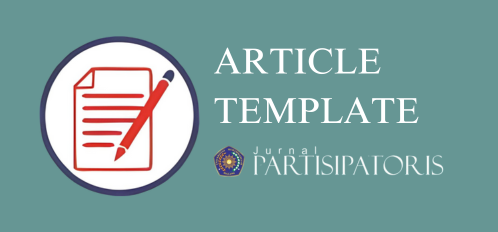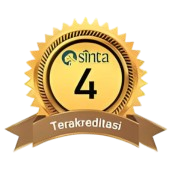GREBEG PANCASILA VALUES AS SOURCES OF LEARNING SOCIAL STUDIES
Keywords:
Grebeg Pancasila, learning resources, social studies learningAbstract
That in delivering the material, the teacher still uses conventional methods. The teacher is more dominant in delivering the material and students only take notes. Most teachers are more oriented towards understanding and mastering material based on textbooks without relating existing phenomena. For example, when explaining about culture, only a general description is given. Therefore, to be able to fulfill the initial goals of social studies education, it can be done through fun learning that is close to the scope of students' lives. The surrounding environment can be used as a tool as a source of social studies learning so that the explanation of the material does not only refer to the explanations in the textbook but can also help students get to know the surrounding environment better. This can be done through learning based on the cultural capital of the local community. One of the objectives of this research is to develop a learning resource instrument based on the cultural capital of the Grebeg Pancasila ceremony for junior high school social studies lessons. The theoretical studies used are junior high school social studies learning, cultural capital, learning resources and the Pancasila Grebeg. The method used is descriptive qualitative and takes the research location in Blitar City with the research subject being culturalists/historians, Head of the Department of Tourism and Culture and social studies teacher at Blitar City Junior High School. The results of the study show that there are several values in the Pancasila Grebeg program that are in accordance with the study materials or materials in social studies learning in junior high schools, namely social integration, mutual cooperation and a sense of nationalism. These materials are part of Basic Competence 3.2, mainly studied in class VIII semester 1.
Downloads
References
Azwar, Saifuddin. 2014. Metode Penelitian. (Yogyakarta: Pustaka Pelajar)
Bakhtiar, Amsal. 2005. Filsafat Ilmu. (Jakarta: PT. Raja Grafindo Persada) Bangsa Indonesia”, Jurnal Dosen Fakultas Filsafat UGM, Vol. 18 No. 1 (April 2008).
Baqir, Zainal Abidin. 2010. Integrasi Imu Dan Agama. (Bandung: Mizan Pustaka)
Budi, Winarno. 2002. Teori dan Proses Kebijakan Publik. (Yogyakarta: Media Pressindo)
Djunaidi dan Fauzan. 2012. Metodologi Penelitian Kualitatif. (Yogyakarta: ArRuzz Media)
Frodizi, Risieri. 2001. Pengantar Filsafat Nilai. (Yongyakarta: Pustaka Pelajar)
Geertz, Clifford. 1981. Abangan, Santri, Priyayi Dalam Masyarakat Jawa. (Jakarta: Pustaka Jaya)
Hadi, Sutrisno. 1989. Metodologi Research. (Yogyakarta: Andi Offser)
Hutchinson, John. 2005. Nations as Zones of Conflict. (London: Sage Publication)
Islamy, M Irfan. 2007. Prinsip-prinsip Perumusan Kebijakan Negara. (Jakarta: Bumi Aksara)
Jhonson, Doyle Paul. 1994. Teori Sosiologi Klasik Dan Modern, (Jakarta: Gramedia Pustaka)
Kartodirjo, Sartono. 1999. Multidimensi Pembangunan Bangsa Etos Nasionalisme dan Negara Kesatuan. (Yogyakarta: Kanisisus)
KBBI, Kamus Besar Bahasa Indonesia (KBBI), http://kbbi.web.id, diakses 28 Juli 2021
Koderi, M. 1991. Banyumas Wisata dan Budaya. (Purwokerto: Metro)
Koentjaraningrat. 1984. Kebudayaan Jawa. (Jakarta: Balai Pustaka)
Koentjaraningrat. 1990. Pengantar Ilmu Antropologi. (Jakarta : Rineka Cipta)
Koentjaraningrat. 2002. Manusia dan Kebudayaan di Indonesia. (Jakarta: Djambatan)
Moleong, Lexy J. 2014. Metodologi Penelitian Kualitatif. (Bandung: Remaja Rosdakarya)
Narwoko, J. Dwi dan Bagong Suyanto. 2004. Sosiologi: Teks Pengantar dan Terapan. (Jakarta: Kencana)
Nasution, S. 1988. Metode Penelitian Naturalistik Kualitatif. (Bandung: Tarsito)
Pratiwi, Citra Ayu. 2017. Harai: Telaah Konsep Religi Koentjaraningrat. (JAPANOLOGY, VOL. 5, NO. 2, MARET – AGUSTUS)
Purwadi. 2007. Ensiklopedi Adat-Istiadat Budaya Jawa. (Yogyakarta: Panji Pustaka)
Scheler, Max. 1973. Formalism in Ethics and Non-formal Ethics of Values (A New Attempt toward the Foundation of an Ethical Personalism). (Evanston: North western University Press)
Sholihin, Muhammad. 2010. Ritual dan Tradisi Islam Jawa. (Yogyakarta: Narasi)
Shulhan, Muwahid. 2013. Gaya Kepemimpinan Kepala Madrasah dalam Meningkatkan Kinerja Guru. (Tulungagung: STAIN Tulungagung Press)
Silalahi, Ulber. 2010. Metodologi Penelitian Sosial. (Bandung: Refika Aditama)
Soeleman, Munandar. 2000. Ilmu Sosial Dasar Teori dan Konsep Ilmu. (Bandung: Refika Aditama)
Sudrajat, Ajat. 2014. Nilai-Nilai Budaya Gotong Royong Etnik Betawi Sebagai Sumber Pembelajaran IPS. (Bandung: Disertasi tidak diterbitkan)
Sugiyono. 2005. Memahami Metode Penelitian Kualitatif. (Bandung: Alphabeta)
Sunarto, Kamanto. 2004. Pengantar Sosiolog. (Jakarta: Penerbit Fakultas Ekonomi, Universitas Indonesia)
Sunjata, Wahyudi Pantja. 1997. Kupatan Jalasutera Tradisi, Makna dan Simboliknya, (Yogyakarta: Depdikbud)
Suprayogo, Imam & Tobroni. 2001. Metodologi Penelitian sosial Agama, (Bandung Rosdakarya)
Suseno, Franz Magnis. 2000. 12 Tokoh Etika Abad ke-20. (Yogyakarta: kanisius)
Suseno, Franz Magnis. 2005. Pijar-Pijar Filsafat: dari Gatholoco sampai filsafat Perempuan dari Adam Muller ke Postmodemisme). (Yogyakarta: Kanisius)
Sutiyono. 2013. Poros Kebudayaan Jawa. (Yogyakarta: Graha Ilmu)
Sutopo. 2002. Metodologi Penelitian Kualitatif. (Surakarta: USN Press)
Tri Haryanta, Agung. 2013. Kamus Antropologi. (Surakarta: PT Aksarra Sinergi Media)
Wahana, Paulus. 2004. Nilai Etika Aksiologi Max Scheler. (Yokyakarta: Kanisius)
Widjaja, A.W. 1986. Komunikasi dan Hubungan Masyarakat. (Jakarta: Bina Aksara)
Downloads
Published
How to Cite
Issue
Section
License

This work is licensed under a Creative Commons Attribution-ShareAlike 4.0 International License.
Authors who publish with Jurnal Partisipatoris agree to the following terms:
- For all articles published in the Jurnal partisipatoris, copyright is retained by the authors. Authors give permission to the publisher to announce the work with conditions. When the manuscript is accepted for publication, the authors agree to the automatic transfer of non-exclusive publishing rights to the publisher.
- Authors retain copyright and grant the journal right of first publication with the work simultaneously licensed under a Creative Commons Attribution-ShareAlike 4.0 International License that allows others to share the work with an acknowledgment of the work's authorship and initial publication in this journal.
- Authors are able to enter into separate, additional contractual arrangements for the non-exclusive distribution of the journal's published version of the work (e.g., post it to an institutional repository or publish it in a book), with an acknowledgment of its initial publication in this journal.
- Authors are permitted and encouraged to post their work online (e.g., in institutional repositories or on their website) prior to and during the submission process, as it can lead to productive exchanges, as well as earlier and greater citation of published work (See The Effect of Open Access).











